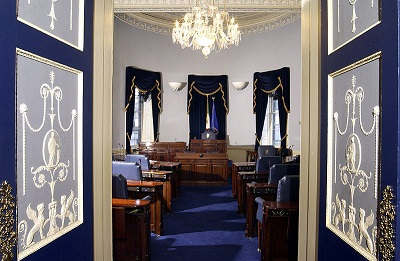Contributing Writer ¦ Nicholas Kenny
The 15th of October, 2013 – the day the budget for 2014 was announced – a friend of mine, knowing that I commute to college, advised me to get an earlier bus home, as he wouldn’t want to be waiting on public transportation “after the budget comes out”, implying that the streets would be filled with protesters.
Sure, the advice in itself wasn’t bad. The buses were, indeed, considerably delayed, but that’s no new experience to a frequent Bus Eireann user, and, yes, there were a good number of protests on-going as I left the city that evening. However, this isn’t what stuck with me as my long awaited bus finally pulled away, “speeding” me back home, but the sheer hypocrisy of the situation.
Earlier this month, the Irish people had an opportunity to make an actual difference on how this country is run, in the form of the twin referendum over the proposed dissolution of the Seanad, and the establishment of a Court of Criminal Appeal. How did we react to this opportunity, this chance to finally have our say on the politics of our time?
Well, most of us simply ignored it.
With a shockingly low turnout of 1,240,729 votes cast, which, in some areas, didn’t even reach 40% of the potential electorate, the Irish people finally proved a point that has made itself more and more evident over the recent years:
We’ll complain about how the country is run, we’ll condemn the few who try and pull the country up from the mire that it has found itself floundering in and always, always, hold the certainty within our hearts that any one of us “could do a better job”. However, ask us to do something, to give up our time for the betterment of our country, and we’ll stand united in our reluctance and distaste.
To put this into perspective, two days later, 970,600 people tuned in to watch the Season Four premiere of the popular television series, “Love/Hate”, from the comfort of their own homes. Then again, perhaps we should take this as a good sign, and be pleased by the fact that, in this day and age, the government of our country can prove to be just a little bit more popular than an RTE crime drama.
In a country that is preparing to celebrate, not three years from now, the centenary of a moment when Irish men and women took a stand against the oppressors of the time, seeking to gain Ireland’s freedom from the tyrannical rule they found themselves under, the fact that we should choose to ignore the rights that they gave their lives, and yet celebrate their sacrifice, can only be described as the basest hypocrisy.
Now, after our government are forced to face the fact that they’re now going to have to continue funding the Seanad, while also paying out towards the establishment of a new Court of Criminal Appeal, people are already lashing out, claiming, as they always do, that the government are targeting the old, the young and the vulnerable.
Well, it’s not like we’ve made it easy for them to go after other targets, now, is it?
Of course, the reader might ask how I would try to rectify this. If I, with all my words of derision, have a solution to propose, or whether I share the characteristics of those whom I am scorning, and, like the people of this country, am filled with complaints instead of resolutions.
Unfortunately it will take a person far more intelligent than I to find a resolution to the current economic mess we have found ourselves in, but the harsh reality of the situation is that, one way or another, we are going to have to pay for it. If the ways the government propose seem unfair, well then it’s fine to complain up to a point, but ask yourself this:
How would you resolve this problem?
For those who would reply with the tired cliché “Tax the rich”, it might be worth noting that the few Irish men and women privileged often don’t pay taxes in Ireland, and those who do are often employers that the Irish government have little choice but to protect, or else we might find our unemployment rate rising in tangent to the dole queues.
However, I can provide a solution to the growing disinterest our nation has in the politics of this country. I simply propose that we follow the Australian system, where they regard voting not solely as a right, but as a responsibility. Voting is not optional, allowing the people to take up the ways of sloth and ignorance in regards to political affairs that is plaguing our country, but compulsory.
Those that do not vote, who choose to ignore their responsibility in ensuring that their government is a true representation of the will of its people, are fined. Through this, we will nature of despondence and disinterest which has fallen over this country in regard to politics, and in this global recession, the opportunity for a new stream of revenue should not be ignored.







